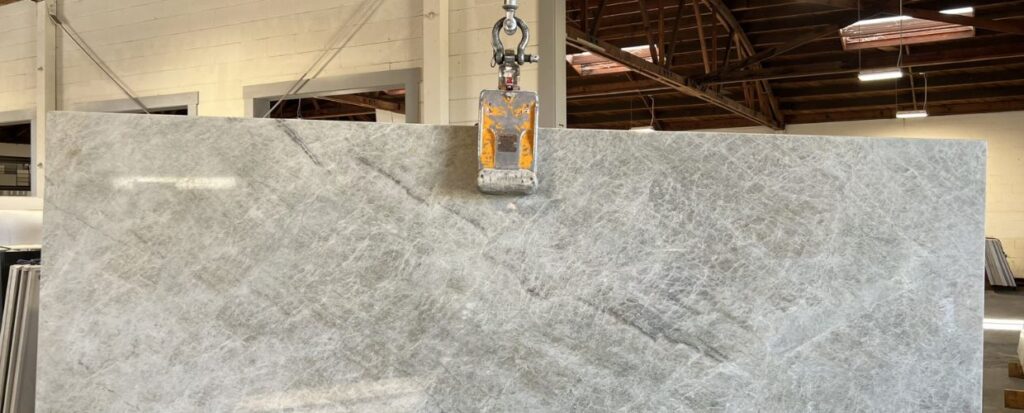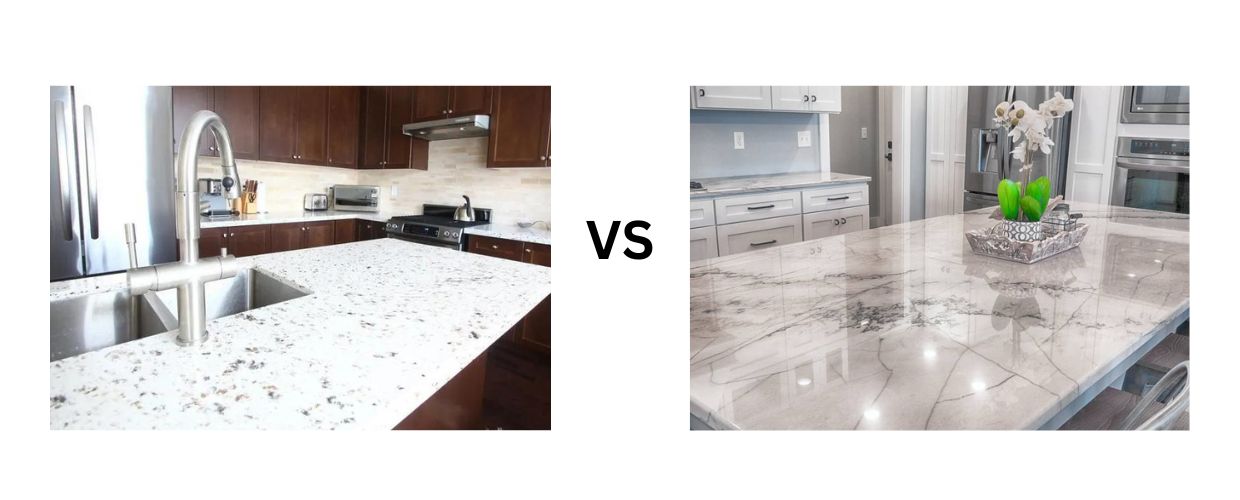
Quartzite countertops are a popular choice in home design, made from a natural stone known as quartzite. This stone is formed through the metamorphism of quartz-rich sandstone, which undergoes extreme heat and pressure in the earth to become hard and dense. Quartzite has a similar look to marble but offers greater durability and resistance to wear and tear, making it an excellent choice for countertops.
The appeal of quartzite lies in its natural beauty, with each slab having unique patterns and colors, ranging from whites and grays to blues, greens, and even pinks. It’s also highly resistant to heat, scratches, and staining, although it may require sealing to maintain its non-porous properties and prevent etching or staining over time. Overall, quartzite combines the elegance of natural stone with robust performance characteristics, making it suitable for kitchens, bathrooms, and other areas where durability and aesthetics are important.
Why Choose Quartzite Countertops?
Choosing quartzite countertops for your home can offer several advantages, particularly in terms of aesthetics, durability, and maintenance. Here’s why they might be the right choice:
Natural Beauty: Quartzite is renowned for its striking natural beauty. Each slab of quartzite has a unique veining and color palette, ranging from subtle whites and grays to dramatic blues, greens, and reds. This makes each countertop one-of-a-kind and adds a luxurious and elegant touch to any interior design.
Durability: Quartzite is extremely durable. It is harder than granite and resists wear and tear very well, making it suitable for high-traffic areas like kitchens. It withstands heat, which is ideal for cooking environments where hot pots and pans are placed directly on the surface.
Longevity: Due to its hardness and durability, quartzite lasts a long time without showing signs of aging or damage. It can withstand the daily rigors of kitchen use without scratching or chipping easily.
Value Addition: Quartzite can add significant value to your home. Its luxury appeal and durability make it a desirable feature for potential home buyers, should you decide to sell your home in the future.
Maintenance: Quartzite requires relatively low maintenance. Regular cleaning with mild soap and water is typically sufficient. Though it requires sealing to prevent stains, this is only needed periodically (once every one to two years, depending on usage).
While quartzite is generally more expensive than some other countertop materials, its longevity and aesthetic appeal can make it a worthwhile investment for those looking to enhance the beauty and functionality of their homes.

Quartzite Vs Quartz
Quartzite and quartz countertops each offer unique advantages, making them popular choices for home interiors, but they differ significantly in origin, appearance, durability, maintenance, cost, and environmental impact. Quartzite is a natural stone formed from sandstone that has undergone intense heat and pressure, featuring unique veining and colors that vary with each slab. Quartz, on the other hand, is an engineered material composed of about 90% natural quartz crystals mixed with resins and pigments, offering a more uniform appearance and a wider range of colors.
In terms of durability, quartzite is exceptionally hard and scratch-resistant, excelling in kitchens where heat resistance is crucial. Quartz, while durable, is less tolerant to high temperatures and may require protection from hot items to prevent damage. Maintenance-wise, quartzite needs periodic sealing to maintain its non-porous properties and prevent staining, whereas quartz requires little maintenance due to its non-porous nature, eliminating the need for sealing.
From a cost perspective, quartzite tends to be more expensive due to its natural rarity and the quarrying process involved, while quartz is generally more budget-friendly and offers cost-effective luxury with high-end looks that mimic natural stone. The environmental impact also varies; quartzite has a lower environmental footprint in its natural state but involves significant quarrying, whereas quartz requires extensive processing and uses synthetic materials.

Quartzite Vs Granite
Quartzite and granite are both popular choices for countertops due to their natural beauty and durability, but they have distinct characteristics that may influence your decision. Quartzite is a metamorphic rock formed from sandstone that has been exposed to high heat and pressure, resulting in a strong and dense material. It is known for its crystalline appearance, often resembling marble but offering greater durability. Quartzite’s colors typically include white and grey tones with hints of pink or red, depending on the iron oxide content.
Granite, on the other hand, is an igneous rock composed mainly of quartz, feldspar, and mica. It is one of the hardest materials available for countertops, known for its grainy appearance and the depth of its colors and patterns. Granite offers a wide range of color options and has a slightly rougher texture than quartzite.
When it comes to durability, both materials are highly resistant to scratches and chips. Quartzite, however, is generally harder than granite, making it slightly more resistant to wear and tear. Both stones withstand heat well, making them ideal for kitchen environments where hot pots and pans are common.
Maintenance for both materials involves regular sealing to prevent staining. Quartzite is more porous than granite and may require more frequent sealing to keep its non-porous qualities. Granite also needs sealing but is less likely to absorb liquids quickly, giving you a bit more time to clean up spills.
In terms of cost, both quartzite and granite are premium materials, and their prices can vary widely depending on the rarity of the stone and the complexity of the installation. Generally, quartzite can be more expensive due to its rarity and the popularity of its elegant, marble-like appearance.
How Long Do Quartzite Countertops Last?
Quartzite countertops are renowned for their durability and longevity. With proper maintenance and care, they can last for decades—often as long as the lifetime of the home itself. Quartzite is one of the hardest materials used in countertop applications, making it highly resistant to scratches, chips, and general wear and tear.
The key to ensuring the longevity of quartzite countertops is regular maintenance, which includes sealing the stone periodically. Sealing helps to prevent staining and moisture absorption. Depending on the level of use and exposure to staining agents, quartzite countertops might need to be sealed once a year or every few years.
Given its natural strength and resistance to heat, quartzite is particularly well-suited for kitchens where durability is a critical factor. With its ability to withstand the rigors of daily kitchen activities, a quartzite countertop can remain functional and beautiful for many years, making it a worthwhile investment for homeowners looking for both longevity and aesthetic appeal in their countertop choices.
Can You Put Hot Pans Directly On Quartzite Countertops?
Yes, you can place hot pans directly on quartzite countertops without worrying about heat damage. Quartzite is highly resistant to heat, which is one of its major advantages as a countertop material, especially in kitchens. This natural stone’s durability under high temperatures makes it suitable for handling hot cookware directly from the stove or oven.
However, despite its heat resistance, it’s generally a good practice to use trivets or hot pads when placing very hot items on any countertop surface. This precaution helps prevent any potential risk of thermal shock or other damages that could occur from extreme temperatures, ensuring that your quartzite countertop remains in pristine condition for a longer time.
Conclusion
Quartzite countertops offer a superb blend of beauty and durability, making them an excellent choice for those looking to combine aesthetic appeal with functionality in their kitchen or bathroom. As a natural stone, quartzite features unique patterns and colors, ensuring that no two countertops are exactly alike, which adds an element of exclusivity and luxury to any space. Its exceptional hardness and resistance to heat make it ideal for the demands of a busy kitchen, allowing homeowners to place hot pans directly on the surface without damage.
While quartzite requires some maintenance, such as regular sealing to prevent stains and extend its lifespan, the effort is well worth it given the stone’s longevity and the value it adds to a home. Moreover, its natural origins make each slab a piece of earth’s history, bringing an irreplaceable and timeless quality to interior designs. Ultimately, choosing quartzite countertops is an investment in both style and substance, providing enduring beauty and practicality that will satisfy homeowners for years to come.
